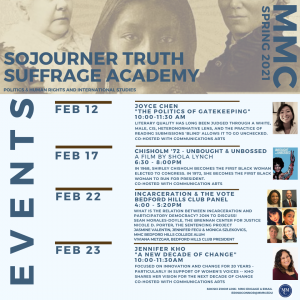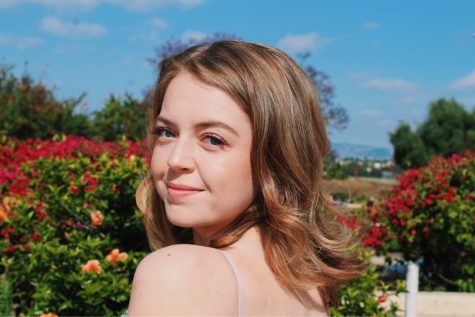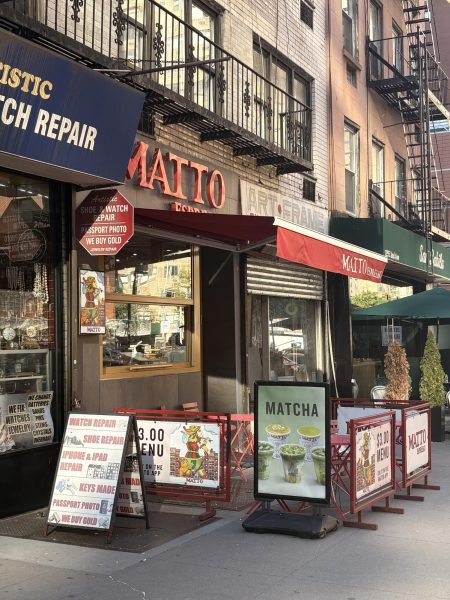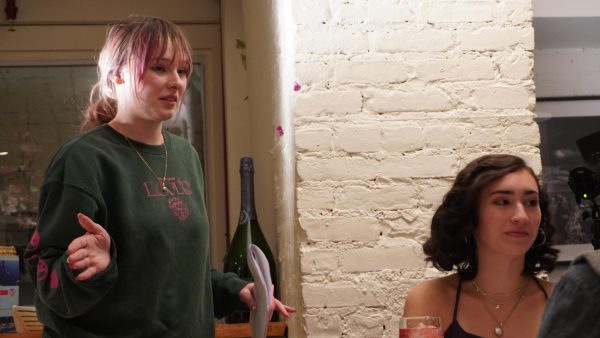The Opening Week of MMC’s Suffrage Academy
Reading Time: 4 minutesOver the past week, Marymount Manhattan College’s Sojourner Truth Suffrage Academy presented a grand opening, hosting different speakers to talk on the theme of suffrage. The debut of the Sojourner Truth Suffrage Academy is timely with the centennial anniversary of women’s right to vote in the United States. Although it is documented that women gained the right to vote in August of 1920, the Suffrage Academy at Marymount offered a diverse exploration and analysis of enfranchisement in the U.S.
The Academy is headed by the Departments of Politics and Human Rights and International Studies, offering courses throughout the departments of the arts, business, communications, history, and the social sciences. A pivotal part of the curriculum for these courses is speaker series hosting different speakers to have riveting discussions with the students from these courses and the greater Marymount community. Our greater Marymount community includes the students enrolled in the Prison Education programs at Bedford Hills and Taconic Correctional facilities who are able to acquire the recordings of the speaker series events.
Kicking off the first week of events, the PHR and IS departments co-hosted the first event with the Communications Arts department on February 8, welcoming Demian Dineyazhi (they/them) to talk to our community about settle-colonialism, gender constructs, and Indigenous culture. Three films were screened: Without a whisper: KONNÓN KWE, by Katsitsionni Fox; Indigenous Luv (Hanky Code) and Man Size (Revisited), by Demian Dineyazhi. After the screenings, Demian Dineyazhi discussed how we can evolve into the future with the notion of simply appreciating ourselves, each other, and the world beyond us, outside the bounds of binary social constructs.
Dineyazhi points out the myth of origins surrounding the women’s movement and the aspect of white saviorism surrounding the story. The women’s movement did not start in Seneca Falls, it started with the Indigenous nations before the settlers colonized their lands. “Speaking doesn’t make you vulnerable,” Dineyazhi says. It is key to our growth that we correct records and rethink how stories are told and portrayed. A key takeaway from this talk is that we are more than just individuals, we are a part of a greater community that is rooted in harmony and kinship- but only if we truly get out of the individualist mindset.
The second event took place on February 9th, featuring the honorable guests Sally Roesch-Wagner and Dina Gilio-Whitaker on the topic of “Hearts on the Ground.” Sally Roesch-Wagner, who was featured in Without a Whisper, is a historian of the suffrage movement and women’s studies. Dina Gilio-Whitaker lectures on American Indian Studies at California State University San Marcos, as well as being heavily involved in American Indian environmental justice policy planning. This talk focused on the theme of living with “an ethics of care.” In order to live this way, it is crucial to take down the settle-state and get outside the box that is settler-colonialism. As a result of this box, different stories and histories of women’s suffrage have been trapped or misplaced completely.
Similar to what Dineyazhi discussed, Roesch-Wagner and Gilio-Whitaker talked about transcending past this individualistic attitude when it comes to life and partaking in social movements. Gilio-Whitaker made the point that we must start looking across at animals, instead of looking down on them. It takes an entire shift in mindsets to get out of the assimilation and settler-colonial framework.
For the last event of the opening week on February 12th, the PHR and IS departments co-hosted with the Communication Arts department to welcome Joyce Chen for a talk on “The Politics of Gatekeeping: On Reconsidering the Ethics of Blind Submissions.” Chen is the Managing Editor and one of the cofounders of The Seventh Wave, and she brought the question of “What are options to make literary magazines more equal?”
She discussed how the literary world can often be limited by the work being primarily judged by white cis men. Chen analyzes how the quality of work within literature has been viewed through a very narrow lens for a long time. The use of blind submissions is a technique to make literature perceived more equally.
Professor O’Connor, the Associate Professor of Sociology and Chair of the Department of Politics and Human Rights, reflects on the first week of the Suffrage Academy and expresses: “I couldn’t have been more thrilled with the Opening Week of the Sojourner Truth Academy. I am still thinking about it! I was grateful to host Demian Dinéyahzi’, whose art-activism brings the historical reality of forced gender binarization in colonization home. So too, I’m indebted to Dina-Gilio-Whitaker and Sally Roesch-Wagner for squarely situating the question of ‘women’s rights’ in the context of both Native American genocide and pre-colonial indigenous gender equality among the Haudenosaunee and others. These speakers bring light and hope in terrible times! Thank you MMC! I look forward to this critical story unfolding, particularly with our Sojourner Truth Keynote Speaker, Martha Jones on March 9 and (hopefully) to an in-person Suffrage Walk through Greenwich Village in the spring.”

The Sojourner Truth Suffrage Academy is off to a great start and will be hosting more events in the weeks to come. If you are interested in listening and contributing to thoughtful discussions on themes within enfranchisement, there are many opportunities for anyone within the Marymount community to participate. The next event to clear your schedule for is on Wednesday, February 17th from 6:30-8:00 pm, where the film Chisholm ‘72- Unbought and Unbossed by Shola Lynch will be screened.
To view the upcoming list of events, check out the Sojourner Truth Suffrage Academy page here. If you are interested in learning more about the Academy, click here.
*The Monitor updated this article with an addition of a quote on 2/15 *







Joel Stafford • Feb 16, 2021 at 9:56 am
Great job Averee! I love reading what you have to say about these subjects the speakers dive into. You shine a light on the enfranchisement these speakers talk about and do a great job advertising the event for students to attend to.